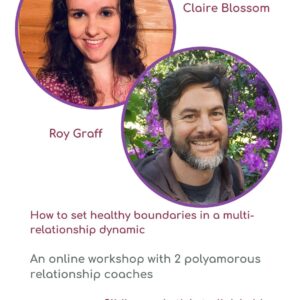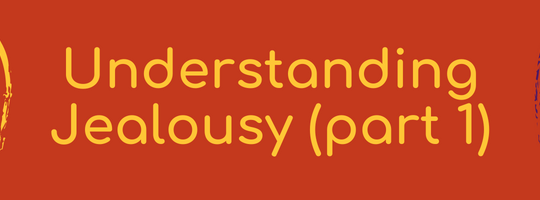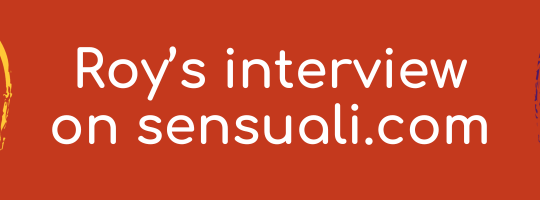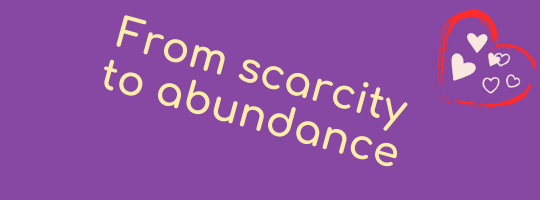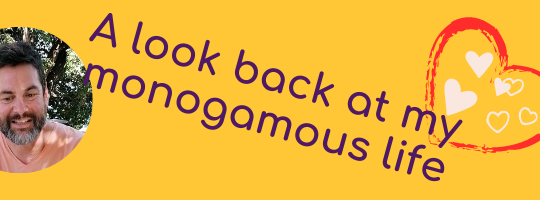Watch the Instagram video and workshop here.
Read the transcript for the pre-workshop chat below.
Roy: In some of my past monogamous relationships, I was I was told I was being selfish for wanting things and not respecting their needs and boundaries which I didn’t know about initially because it wasn’t communicated. I started believing that I’m selfish for wanting my needs met. For me, the path through polyamory showed me how important it is to fully discuss all these boundaries upfront. That starts with knowing what I need in order to set boundaries for that. If I start with that right away in the beginning of relationship, it’s not really about being selfish. There’s a clear understanding of what I can give in my capacity, what are my needs around emotional intimacy, physical connection, time, and things like that. When we’re discussing it in advance, you can’t miscommunicate down the line. We are creating a clear foundation for the relationship. I learned a lot from that process but I started in a pretty dismal place I would say, when I was younger.
This was just a little warm up, now I’d like to introduce Claire.
Claire: Hi, my name is Claire blossom and I am a non-traditional relationship coach. I focus on people in polyamorous, other consensually non monogamous relationships, and I’m over in Athens, Georgia on the east coast of the United States.
Roy: I’m Roy Graff and I run Open Relating which is a website dedicated to non-traditional relationship dynamics and learning about your boundaries, yourself and your needs. I run a five weeks course on conscious connected and autonomous relationships. I’m also a relationship coach doing one on one, couples and polycule coaching, and I’m training to be a psychotherapist. I’ve been polyamorous for about 10 years. I live in London, UK.
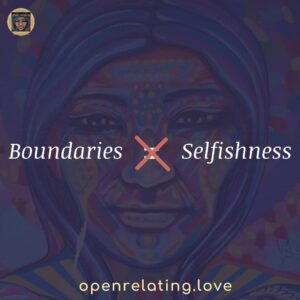
I’m excited about our upcoming workshop in a couple of weeks on the 30th of May which will be all about setting healthy boundaries and relationships and wanted to have a little warm up chat with you to look at what we’re going to be covering. When I proposed the idea of boundaries, as a workshop, what were your initial thoughts around that?
Claire: I thought it’s really great topic that everyone wants to know more about. Probably just about everybody has some question around boundaries in their own lives. I think that could be a lot of different things, it might be, I’m not sure if I’m good at setting boundaries, I’m not sure about the boundaries of other people in my life so I think everybody comes at this question from a different angle, so I thought it would be interesting to explore what that means to both of us and then also to everyone who participates in this workshop.
Roy: Boundaries are a huge topic. You are dealing with boundaries in almost every aspect of your life when you’re in relation to another person and that can be in family situations, work, friends and also in romantic and sexual relationships. I think it’s important to clarify that our focus will be on relationships, although having clear boundaries is something that once you’re practicing, and confident of your boundaries, it can be applicable to many other aspects of life.
Claire: I think that when you’re focusing on your relationships, maybe that’s what feels the most urgent so you might then figure out what you want from your other relationships in your life or thinking about your romantic relationships, if you want to call them that.
Roy:What would you want to tell us about what you’re planning to talk about at the workshop? What areas and topics related to boundaries do you want to cover?
Claire: I am focusing on a concept that I call spiky boundaries and smooth boundaries. Spiky boundaries are the type where we set those boundaries and we feel maybe angry or defensive about them like this is who I am these right boundaries and I will be very upset if you crossed my boundary. And I talk about the fact that we’re always going to have times where spiky boundaries feel important to set, and that we can get a lot of pleasure and satisfaction in life, from, from getting a lot of space around those boundaries so I call that smooth boundaries so when you feel smoother and a little like less defensive more just calm in the fact that it’s a boundary that matters to you, then that can be a really useful way to grow or it allows us, I think it allows us to grow and go for what we really want, rather than stay in one place, feeling very defensive against what we don’t want. What do you plan to talk about regarding boundaries what feels important to you?
Roy: Boundaries form a core component of my course on conscious relationships. I want to bring a little bit of that part of the course that talks about different kinds of boundaries we all have, whether we know it or not. Sometimes they’re porous, sometimes like you said they are very spiky. How we interact, whether out of ignorance of the boundaries or knowledge of them, really impacts on how well we can communicate and get along with other people. I’m going to talk about the different boundaries, in physical realm, social, emotional, sexual, cognitive and material. They’re basically different aspects of maintaining and protecting our needs. I also want to talk more about my own experience of coming to the realization of how important it is to have boundaries, not just so I can meet my needs and feel safer in a relationship. If I don’t know my boundaries, I may agree to certain things that my partner requests that are part of their needs, and initially think that I can handle it and support them. At some point I am going to hit a wall of my hard boundary and then I will either disappoint or hurt them. If I don’t know myself enough to be able to set a boundary, then that’s going to lead to conflict. When a partner comes to us with a clear boundary, even if it’s something that we didn’t expect and feel that it’s not in our best interest, the fact that they came to us and trusted us to share this is in itself appreciated. I think it’s a great sign of intimate interaction, to be able to express that boundary, and respect them for that.
Claire: That’s really good. Do you have an example of a boundary situation that you’re planning to talk about more?
Roy: There are a number of things, but something that happens regularly, is that as somebody who is training in psychotherapy I can very easily jump into the therapist mode when I’m speaking to partners about their emotional issues. They will have a boundary that they do not want me, as a romantic partner, to therapise them and I don’t want to, but sometimes it’s like an instinct. So if they come to me with their issue they want me to be a supportive partner and not try and solve their problem. I need to remember that and respect it. If I don’t, then they would be asserting their boundary. I need to very quickly correct this and honour their boundary which looks like: “yes, you’re right. I’m sorry. It’s not my place”. They would appreciate it a lot more than me trying to solve the problem for them. There are a lot more personal examples, from clients and from past workshops that I would share in the workshop in more detail. How about you, do have some good examples?
Claire: I think one example that always comes to mind is on the third or fourth year of my relationship with my nesting partner of nine years. He had been in a relationship with someone else for a couple years, and I realized that we had talked about our relationships with other people together quite a bit, and they were starting to have a harder time than they have really ever had before it was like the first like real hurdle like real mistake, that one of them made in the relationship. And so they were having a difficult time and I realized that I actually wanted to not hear that much about the relationship anymore. I didn’t want to hear about the struggles as much anymore.
I had a friend who was a psychotherapist in training who came to visit and helped me think through it a little bit, and it reminded me of growing up with my brother (rest his soul, he passed away from from brain injury, and he had traumatic brain injuries for for a good part of this life). I would put myself aside a lot growing up, thinking he needs more attention than I do. And I think that’s an adaptive thing and also something that as an adult I didn’t necessarily want to repeat. So while my partner was having all this conflict I find myself saying, okay, well you know I’ll just be over here taking care of myself. It’s always good to take care of ourselves first, but this is a boundary I really wanted and it wasn’t that difficult actually with my partner, once I decided it was something that mattered.
If you’re in a V, do you talk about the relationship in the middle of the V or do you not? Where are the boundaries there?
Roy: I think that it’s very personal to each individual. When you’re the hinge of a V, both partners might have very different needs and ways of communicating. One might be perfectly happy with hearing all information and the other may not. One may be fine with me talking about her to the other partner and the other may not. It’s really personalized so I would sit down with them and want to understand what is their comfort zone and boundaries. Certain things are non negotiable, for example, we all agree that boundaries around sexual health and time management need to be transparent. We want to protect everybody so if I have any kind of sexual contact with people outside of our established dynamic, then they will both know about it. If I am planning something with one partner that might impact on the time planning of the other, of course I need to let them know as soon as possible. So in that sense, I need to respect that they have boundaries for their own time and their own autonomy and planning and not get in the way of or make it harder for them.
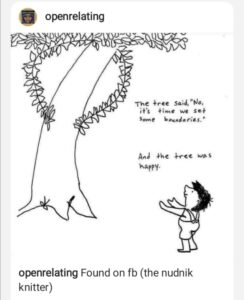
One thing you touched on that I think is really important to cover is how much our upbringing, childhood, relationship with our parents and our attachment style impacts on the way we form boundaries and what those are. It’s a huge topic, I think is really important to cover. I come across people who say, my childhood was great, my parents were very loving and supportive, I didn’t want for anything and felt emotionally secure and very supported. There is a shadow to that which is, they never formed their boundaries. Their parents didn’t have boundaries for them. It didn’t support their own autonomy and development of independence. Or, their parents shared too much about their own personal life and turned them into a friend more than a parent. They then may come into a situation where they have no clear boundaries with a romantic partner as well, and end up being much more codependent than is healthy.
Claire: There is the question of who should attend this workshop?
Roy: Even six years ago I would have loved to attend a workshop like this. In my first polyamorous relationship I came in without any boundaries, and ended up going along with what my partner’s boundaries were, which wasn’t right for me. I just didn’t know how to formulate my own. We kept getting into this repeated cycle of conflict because of that. I would have loved to have someone explain to me why understanding my boundaries is so effective. Anybody who is starting a polyamorous journey, or has had instances in past relationships whether monogamous or non-monogamous with a cycle of toxic behavior or codependency. I think for them this would be a really good workshop. If you’ve had or have a partner that doesn’t seem to be expressing very clear boundaries or it’s confusing to know what the boundaries are, attending the workshop can help work with them on these issues, even if they themselves are not planning to be at the workshop.
Claire: I think there’s already so much that can be done just by one partner being involved. You don’t have to have both people or multiple people there that way even if one person is struggling with another person’s approach and they think it’s that person that needs to change. You get so much out of doing self development work, just when it’s you there. I would say anybody who, when they hear the word boundaries, there’s something about it that maybe is triggered for them in a good or a bad way, or there’s something about this where I feel an urge to learn more and to know more about how boundaries show up in their life. I think that that is who this is a good fit for.
Roy: One thing that often comes up is that couples, let’s say a monogamous couple that wants to open up the relationship, potentially never up to this point of opening up, had to really consider too much what their personal boundaries are around physical contact and emotional engagement with others. Those are all new things, maybe they have boundaries around personal time, allocation of resources, things like that, but it is this new realm that they never had to consider before. What often happens is that they start implementing rules as a way of forcing theri partner to respect a boundary, without necessarily challenging the validity of this boundary in the new reality – whether it can be changed. I think that some boundaries we got used to in monogamy, inevitably will need to be changed a little bit to incorporate other partners and other ways of connecting with people. So it can’t be just about me imposing my way or the way I want to do things on my partner, it has to be a full on conversation that’s very raw about what are the hard boundaries and soft boundaries. Hard boundaries are about our core needs and soft boundaries are around our wants, and there’s flexibility there. Reaching an agreement that respects both partners’ boundaries is much more healthy and balanced than imposing a rule.
Are there big differences in what boundaries might mean in a monogamous relationship to what it might mean non-monogamous relationships?
Claire: You just have to think about it a lot more because there’s a script that’s already been written for you in monogamous relationships a lot of the time. People in monogamous relationships might have various boundaries they don’t know how to articulate like, “I would like to have this certain amount of time to myself, or I would like it if you don’t walk into this room without knocking on it first”. Those are important boundaries as well but I think that when there’s another person involved, that’s where it always gets more complicated because there’s this question of: is there something about this other person, I think there’s always this core question in a non-monogamous relationship which is, is that other person more important than me. How you measure up in the dynamic, am I as important to you as I want to be. In non-monogamous relationships you have to spell out boundaries a lot more.
I also want to say, I’ll definitely be talking about this more on May 30 When we’re doing this. A lot of the time. Trust can take the place of having a lot more micro boundaries. Once you get to know someone’s boundaries really well is this question of well, it’s not like you’re just going to violate their boundaries because you know that they trust you, but you might be able to predict more in advance, like what somebody else would actually want or not want. Say there’s an awkward situation where you don’t have an opportunity to actually ask them ahead of time, and you make a decision without them necessarily consenting to it but just because you trust each other sufficiently that it’s probably going to turn out okay. I have experienced this with my nesting partner in our nine year relationship. That’s not to say that you should stop having boundaries, but just noticing that sometimes out of trust, there’ll be this really clear understanding of each other, that will come through without necessarily needing to have the same kind of conversations you used to have.
Roy: Personal boundaries can change over time. In an open relationship or non-monogamous relationship. as you both grow and experience things you may want to reassess and reevaluate your own boundaries and your joint boundaries. As trust, experience and intimacy build up, you will have less of a need to maintain, define and protect very strict boundaries. As you grow in self confidence, you will know that you can handle yourself in different situations and you can be more of an advocate for yourself so there is less need in for having those boundaries, fully respected by your partner you can take your with yourself and I think you know will will will give more practical, concrete examples in the workshop of what that looks like.


